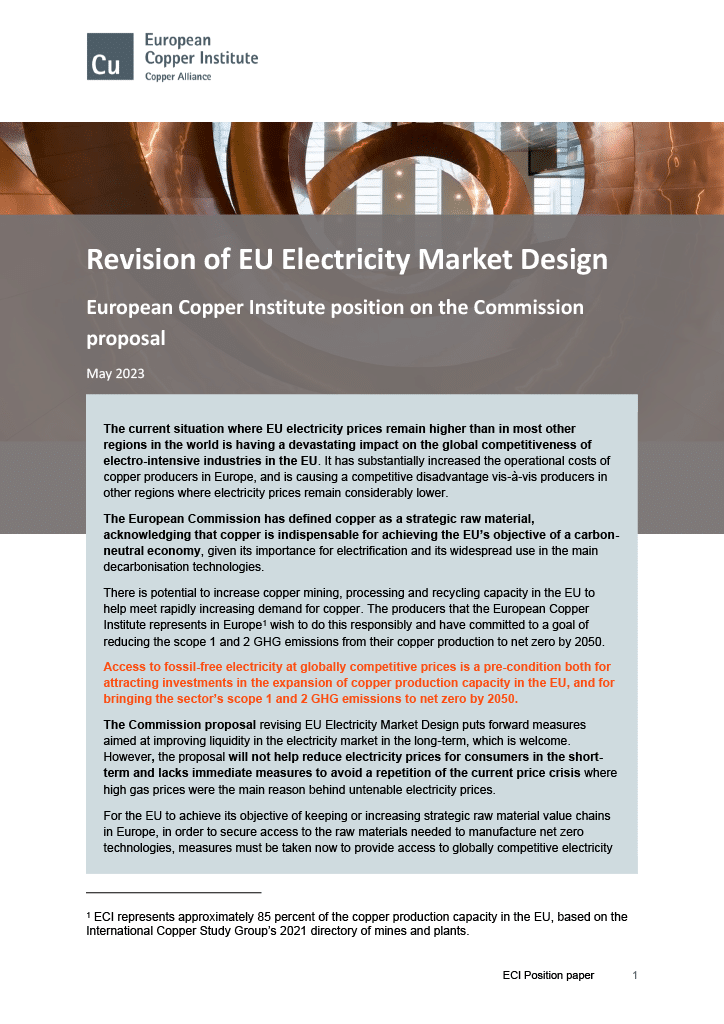European Copper Institute position on the Commission proposal
The current situation where EU electricity prices remain higher than in most other regions in the world is having a devastating impact on the global competitiveness of electro-intensive industries in the EU. It has substantially increased the operational costs of copper producers in Europe, and is causing a competitive disadvantage vis-à-vis producers in other regions where electricity prices remain considerably lower.
The European Commission has defined copper as a strategic raw material, acknowledging that copper is indispensable for achieving the EU’s objective of a carbon-neutral economy, given its importance for electrification and its widespread use in the main decarbonisation technologies.
There is potential to increase copper mining, processing and recycling capacity in the EU to help meet rapidly increasing demand for copper. The producers that the European Copper Institute represents in Europe1 wish to do this responsibly and have committed to a goal of reducing the scope 1 and 2 GHG emissions from their copper production to net zero by 2050.
Access to fossil-free electricity at globally competitive prices is a pre-condition both for attracting investments in the expansion of copper production capacity in the EU, and for bringing the sector’s scope 1 and 2 GHG emissions to net zero by 2050.
The Commission proposal revising EU Electricity Market Design puts forward measures aimed at improving liquidity in the electricity market in the long-term, which is welcome. However, the proposal will not help reduce electricity prices for consumers in the short-term and lacks immediate measures to avoid a repetition of the current price crisis where high gas prices were the main reason behind untenable electricity prices.
For the EU to achieve its objective of keeping or increasing strategic raw material value chains in Europe, in order to secure access to the raw materials needed to manufacture net zero technologies, measures must be taken now to provide access to globally competitive electricity prices for these industries. ECI believes that the following changes are needed to the Commission proposal:
- Amend article 66a on “access to affordable energy during an electricity price crisis” to apply it also to electro-intensive consumers. When the Commission declares an electricity price crisis, electro-intensive consumers should not be excluded from targeted public interventions that member states may decide to adopt in price setting. Member states should have the freedom to decide how to target such interventions.
- Introduce a price shock absorber mechanism that would be automatically triggered when the Commission declares a regional or EU-wide electricity price crisis, to temporarily limit the ability of fossil generation to set wholesale electricity clearing prices in the EU. This would lower electricity prices for all consumers with immediate effect, while preserving the merit order curve and maintaining security of supply.
- Given that a price shock absorber mechanism will only lower electricity prices in crisis situations, it must be complemented with additional measures to provide EU electro-intensive industries access to electricity at globally competitive prices, until such time that sufficient decarbonised generation capacity and flexibility sources have been installed in Europe to bring prices down. To this effect, the proposal should:
➢ Facilitate the access of electro-intensive consumers to competitively priced renewable Power Purchase Agreements (PPAs) by supporting them in the management of shaping risk which arises from the variable nature of RES generation that does not match the stable demand profile of industry.To this end, the wording of article 19a(3) which states that member state backed guarantee schemes for PPAs “shall not provide support to the purchase of generation from fossil fuels” should be amended to clarify that PPAs backed by guarantee schemes “shall not be signed with fossil fuel generation assets”, in order to leave the needed flexibility to manage shaping risk and avoid penalising financial PPAs.
➢ Provide for an amendment to the EU state aid framework to ensure that member states are allowed to support strategic European electro-intensive industries face the high electricity costs, including by introducing transitional industrial electricity price schemes.
- Introduce conditions on the design of two-way Contracts for Difference to mitigate undesired impacts such as reducing liquidity on the PPA and forward markets and further increasing prices for electro-intensive industries
Read the full Revision of EU Electricity Market Design paper

